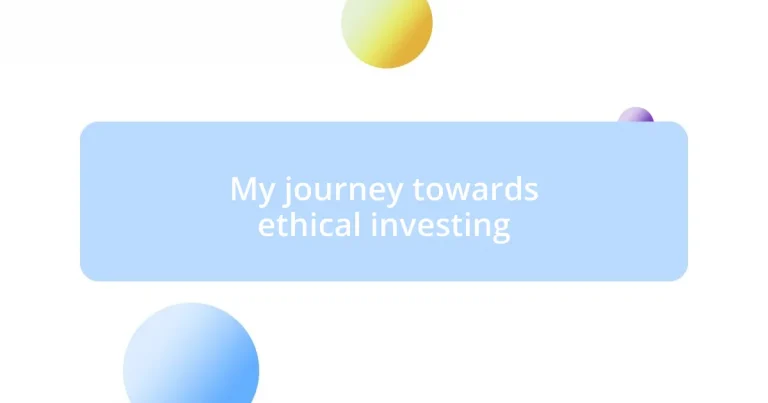Key takeaways:
- Ethical investing aligns financial choices with personal values, promoting sustainability and social justice.
- Defining personal investment values is crucial for meaningful investments and adapting to evolving beliefs.
- Researching options and community engagement enhance understanding and commitment to ethical investing.
- Regularly tracking progress and being flexible with investments ensures alignment with ethical values.
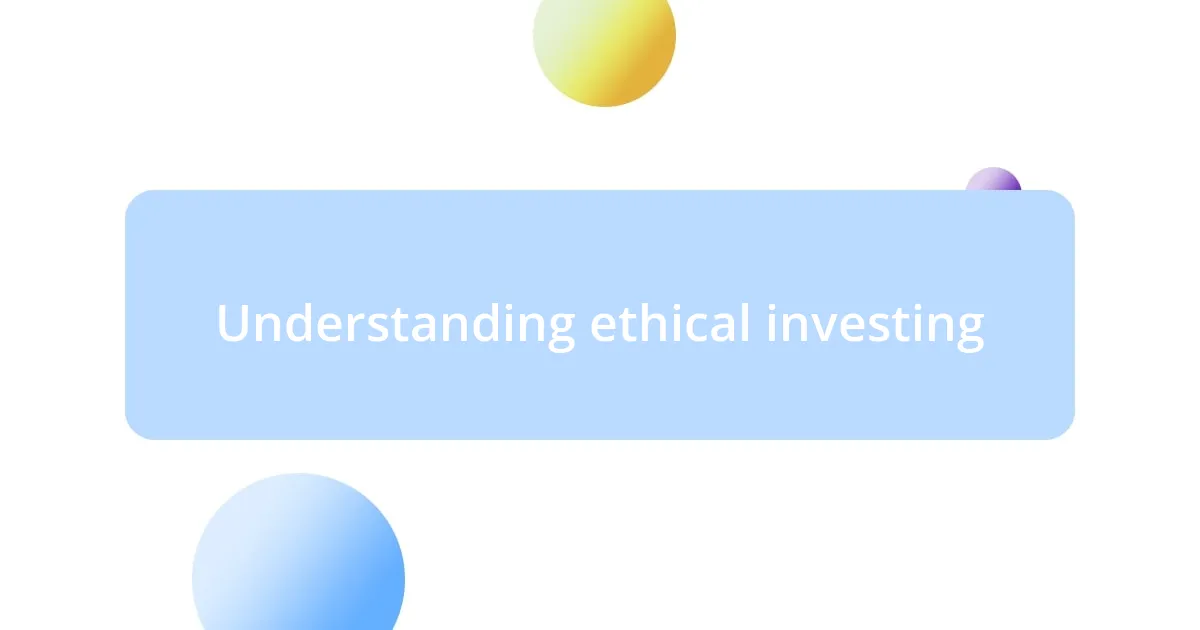
Understanding ethical investing
Ethical investing is fundamentally about aligning your financial choices with your values. I remember the first time I learned about socially responsible companies; I was amazed to discover that I could support businesses that shared my commitment to sustainability and social justice. Isn’t it empowering to think that every dollar you invest can help create a better world?
At its core, ethical investing isn’t just a trend; it’s a movement that challenges the traditional notion of profit. I’ve often wondered how we can balance financial returns with ethical considerations. It became clear to me that investing ethically isn’t merely about avoiding bad companies; it’s also about actively seeking out those that contribute positively to society. This mindset shift can profoundly impact how we view our portfolios and the world around us.
One of the striking aspects of ethical investing is its variety. From renewable energy projects to companies championing gender equality, there’s a wealth of options. This diversity excites me because it opens so many doors for fulfilling investments. Have you ever thought about the ripple effect your investments can create in communities? That realization, for me, transformed investing from a mundane task to a meaningful journey.
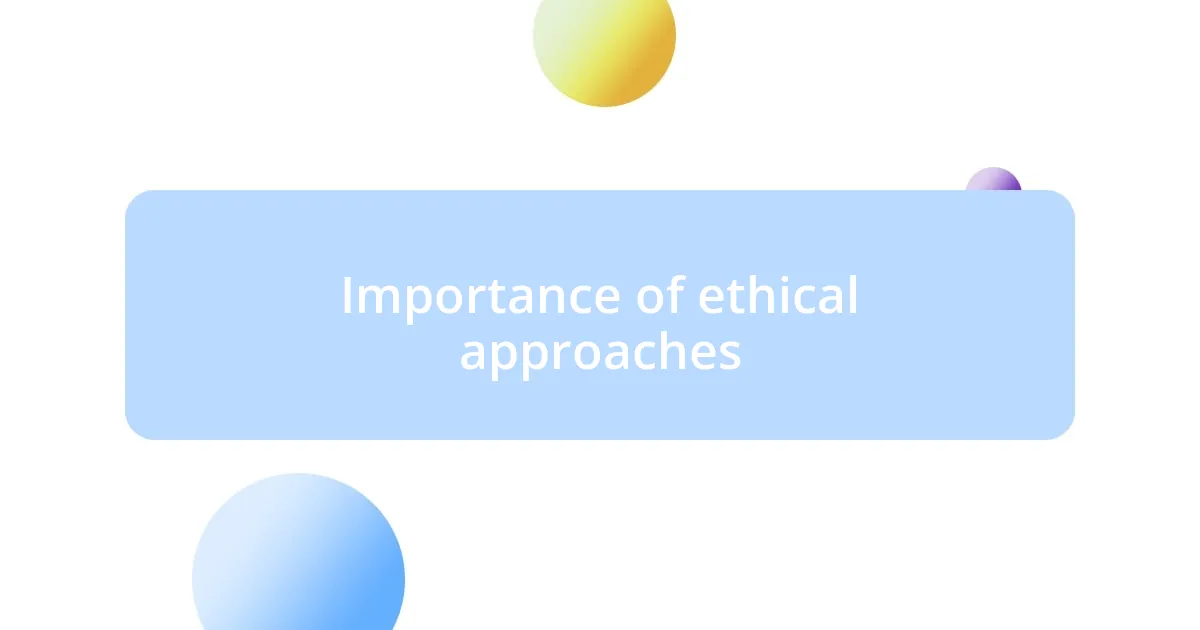
Importance of ethical approaches
Adopting ethical approaches in investing is crucial not only for personal satisfaction but also for fostering long-term positive change in the world. I recall a conversation with a close friend who felt conflicted about her investments. She believed, like many of us, that her money had to work hard for her, yet she also wanted to make a difference. This dual desire is why ethical investing is so important; it allows individuals to bridge the gap between profit and purpose, bringing genuine fulfillment to their financial decisions.
Consider the following reasons why ethical approaches matter:
- Alignment with Values: Investing in companies that reflect our values reinforces our personal beliefs and contributes to causes we genuinely support.
- Encouraging Corporate Responsibility: When investors prioritize ethics, companies are more likely to adopt sustainable practices to attract and retain stakeholders.
- Long-term Financial Viability: Ethical companies often demonstrate resilience, as they are more adaptable to market changes driven by environmental and social considerations.
Reflecting on these points, I believe that taking a stand with our investments cultivates a sense of agency—each choice can resonate beyond mere numbers on a balance sheet.
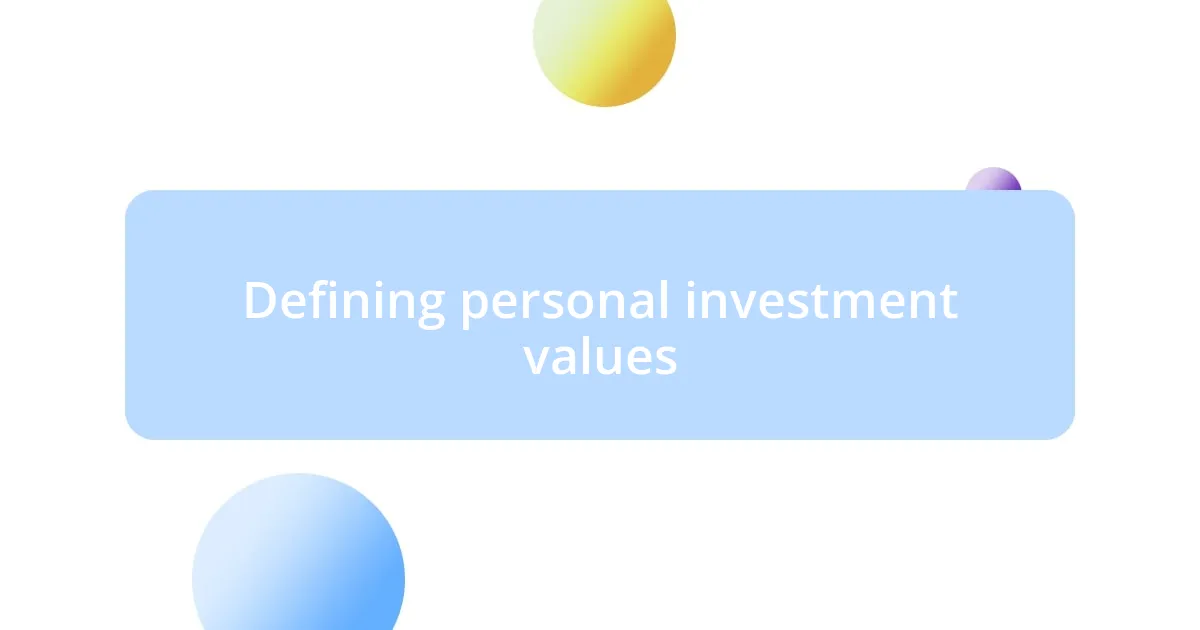
Defining personal investment values
Defining personal investment values is an essential step in my ethical investing journey. I’ve often found myself reflecting on what matters most to me. For instance, when I support businesses that prioritize environmental sustainability, I’m not just investing; I’m aligning my financial decisions with my passion for preserving our planet. It’s remarkable how defining these values gives my investments a deeper significance.
As I delved deeper into my own investment values, I realized how important it is to articulate my priorities clearly. Understanding whether I wanted to focus on social justice, environmental stewardship, or corporate governance helped me narrow down my options. It was an enlightening experience, similar to piecing together a puzzle; each value fit perfectly into the bigger picture of what I wanted my investments to stand for.
Moreover, I discovered that revisiting my personal investment values regularly keeps me aligned with my evolving beliefs. For example, as I learned more about diversity and inclusion in the workplace, I began to prioritize those aspects when selecting investments. This adaptability has made my investment journey not only fulfilling but also transformative, allowing me to grow alongside my values.
| Investment Value | Description |
|---|---|
| Environmental Sustainability | Supporting companies that prioritize eco-friendly practices. |
| Social Justice | Investing in firms that advocate for equality and community empowerment. |
| Corporate Governance | Choosing businesses with ethical leadership and transparent practices. |
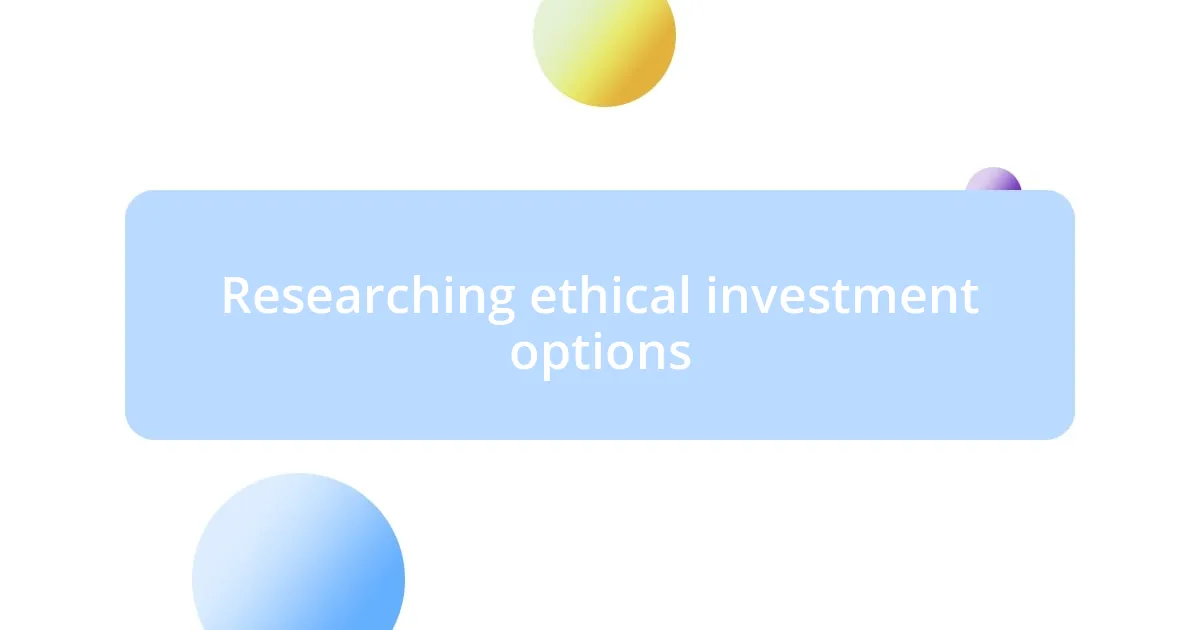
Researching ethical investment options
When researching ethical investment options, I found the internet to be a treasure trove of resources. I remember stumbling upon a website dedicated to socially responsible funds and thinking, “Wow, there are so many ways to invest with purpose!” It really opened my eyes to the variety of options available, ranging from green bonds to sustainable mutual funds. By using these valuable resources, I could grasp which companies genuinely align with my values.
Another key insight I gained is the importance of reading impact reports. I recall the first time I dug into one—I was blown away by the tangible effects my investment could have on local communities and the environment. These reports provide measurable outcomes, and by understanding them, I can see how my money contributes to positive change. Isn’t it incredible to think that a decision I make today can shape a better future?
Lastly, engaging with like-minded communities has been invaluable in my journey. I vividly remember a forum discussion where individuals shared their ethical investment experiences. It was not only reassuring to hear others voice similar challenges and successes, but it also sparked ideas I hadn’t considered before. In these conversations, I often ask myself, “How can we steer our investments toward a meaningful impact?” The insights gained from collective experiences have truly enriched my understanding and commitment to ethical investing.
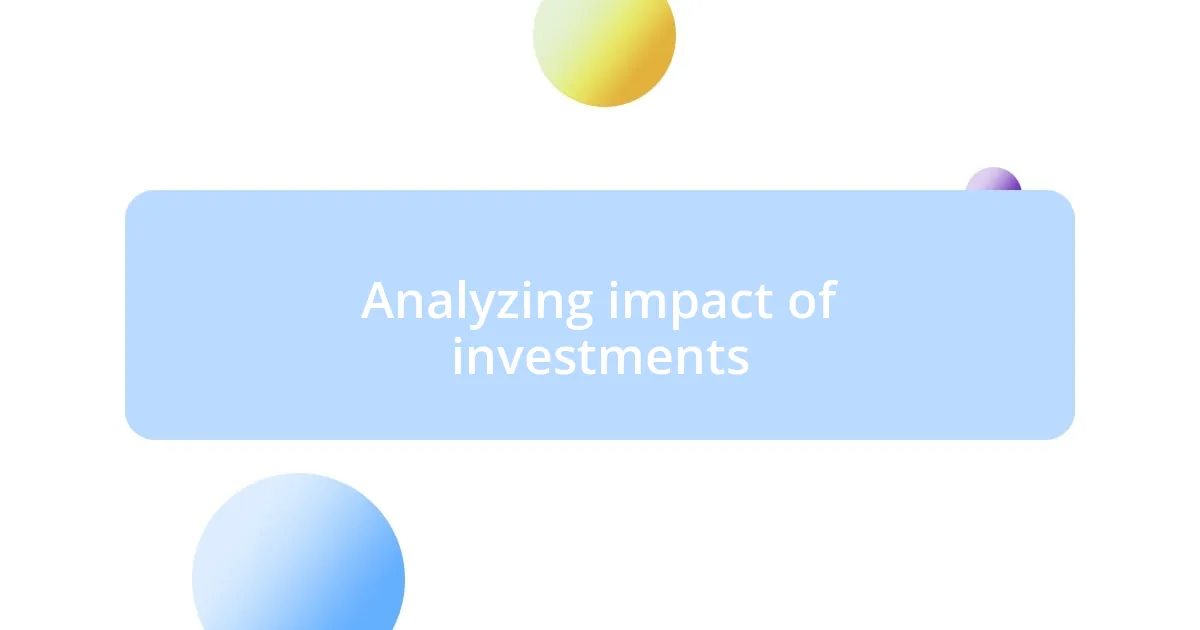
Analyzing impact of investments
When analyzing the impact of my investments, I often find myself diving into metrics that measure success beyond financial returns. For instance, I remember when I first learned about the Sustainable Development Goals (SDGs) set by the United Nations. This framework inspired me to evaluate how my investments align with global targets, like gender equality or clean water access. Asking myself, “What real change is my money fostering?” has been an eye-opening experience, leading me to refocus my investment strategy.
One practical approach I adopted was tracking the social impact of the companies I invested in, which sometimes felt overwhelming. I recall sitting down with spreadsheets, analyzing their community outreach programs and environmental initiatives. This endeavor revealed not just numbers, but also stories of change—like the small business that expanded due to fair lending practices. It made me realize that each dollar I invest carries the potential to create tangible benefits, drawing a direct line between my financial choices and the world around me.
As I became more adept at analyzing these impacts, I felt a growing responsibility to be involved. I began attending shareholder meetings, eager to understand the corporate governance of the companies I supported. My first meeting was a mix of excitement and apprehension; I wondered if my voice could genuinely matter. But as I engaged in discussions about corporate practices, I found that the collective effort of investors could indeed steer companies towards more ethical paths. Isn’t it empowering to know that our investments can not only fill our pockets but also uplift communities?
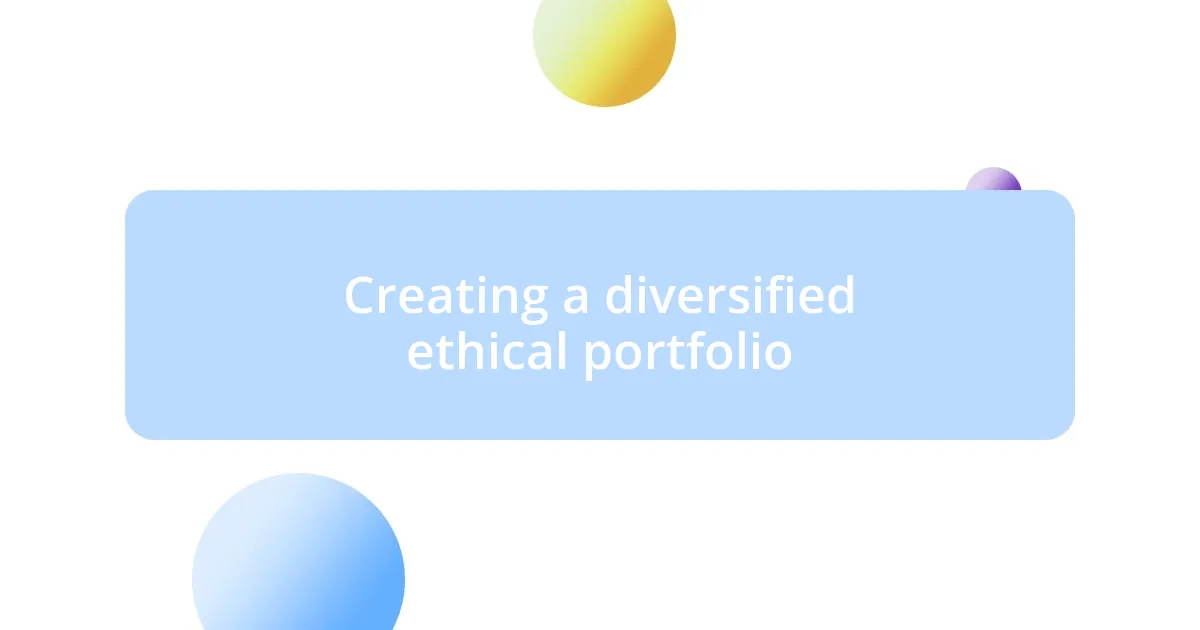
Creating a diversified ethical portfolio
Creating a diversified ethical portfolio can be an exciting yet challenging task. When I first set out on this journey, I realized that the key to diversification wasn’t just about spreading my investments across different sectors but ensuring that each choice aligned with my ethical values. I remember spending an afternoon compiling a list of companies that not only excelled in their fields but also championed sustainability, social justice, and ethical governance. The more I dug, the more I discovered brands I once overlooked that resonated with my commitment to a better world.
As I began to piece together my portfolio, I made it a point to include a mix of asset types, such as stocks, bonds, and even alternative investments like renewable energy projects. I felt a rush of excitement whenever I found a new ethical fund, remembering how overwhelming it initially seemed. Have you ever felt that thrill of uncovering hidden gems? That was my experience every time I identified a fund that supported clean energy or affordable housing initiatives. And, by diversifying across sectors, I could cushion my investments against market volatility while reinforcing my ethical mission.
I also discovered the value of regularly reviewing and rebalancing my portfolio. Initially, I would hold onto investments for too long, even when my values shifted. One memorable moment was when I sold shares from a company that moved away from sustainable practices. It felt bittersweet but necessary—like shedding a weight that no longer aligned with my beliefs. This ongoing process taught me the importance of staying adaptable and intentional about where I placed my resources. Does your portfolio reflect your evolving values? I know mine certainly does now, and it’s a fulfilling journey worth embracing.
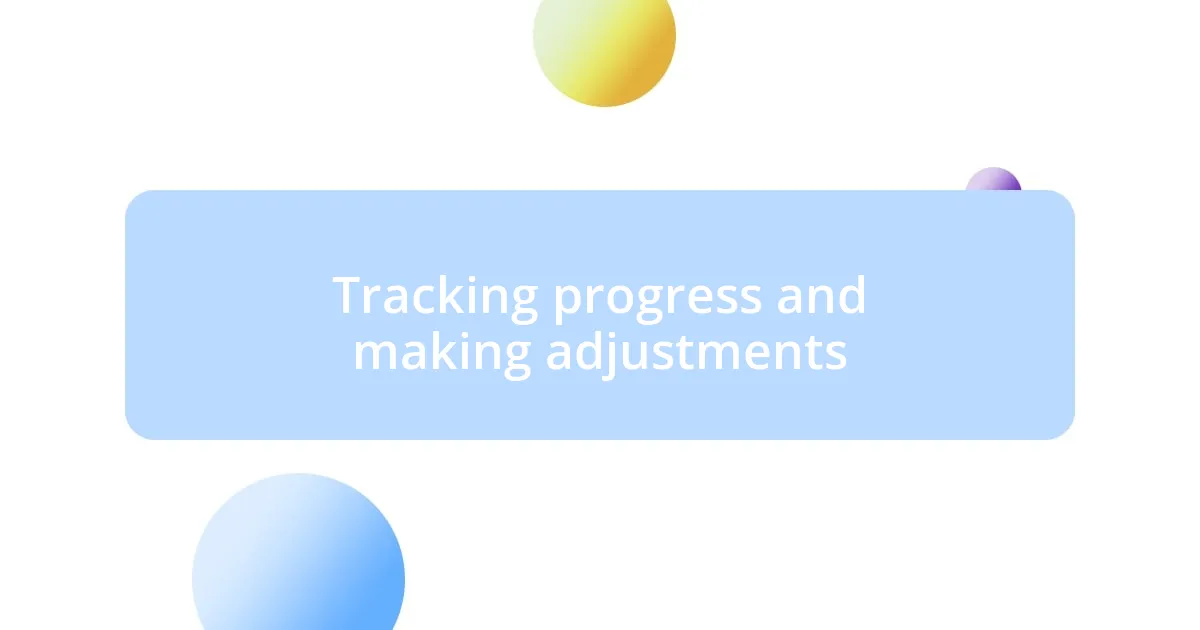
Tracking progress and making adjustments
Tracking my progress in ethical investing is a task I take seriously, as it ensures I stay aligned with my values. I remember setting up a dedicated journal to log my investments, noting not only the financial outcomes but also the social and environmental impacts. It was enlightening to see how certain decisions—like choosing a green energy firm over a traditional utility—could significantly boost my sense of purpose alongside my financial goals. Have you ever felt that thrill when your choices resonate with something deeper than just numbers? For me, that connection has made all the difference.
As I reflect on my journey, I’ve learned the importance of remaining flexible and ready to pivot if an investment doesn’t align with my values anymore. There was a point when I held shares in a company that, despite initially showcasing stellar sustainability practices, began to backtrack due to profit pressures. The day I decided to sell those shares was monumental. It wasn’t just about the money; it was about standing firm in my principles. How often do we allow our investments to dictate our values instead of the other way around? In my experience, taking that stand is a vital step toward true ethical investing.
Moreover, I engage in regular check-ins, perhaps quarterly or biannually, to assess both the financial and ethical performance of my portfolio. During these reviews, I sometimes sit quietly, reflecting on both the progress I’ve made and the adjustments that need to happen. This practice feels rewarding—it helps me reevaluate and recommit to my mission. Have you ever reconsidered a decision that now seems pivotal in hindsight? I find that these moments of reflection not only inspire me to make informed adjustments but also reinforce my commitment to an ethical investing journey.












